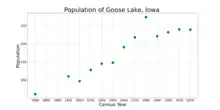Goose Lake, Iowa
Goose Lake is a city in Clinton County, Iowa, United States. The population was 239 at the time of the 2020 census.[2]
Goose Lake, Iowa | |
|---|---|
 Location of Goose Lake, Iowa | |
| Coordinates: 41°58′3″N 90°22′51″W | |
| Country | |
| State | |
| County | Clinton |
| Area | |
| • Total | 0.33 sq mi (0.86 km2) |
| • Land | 0.33 sq mi (0.86 km2) |
| • Water | 0.00 sq mi (0.00 km2) |
| Elevation | 689 ft (210 m) |
| Population (2020) | |
| • Total | 239 |
| • Density | 722.05/sq mi (278.92/km2) |
| Time zone | UTC-6 (Central (CST)) |
| • Summer (DST) | UTC-5 (CDT) |
| ZIP code | 52750 |
| Area code | 563 |
| FIPS code | 19-31665 |
| GNIS feature ID | 0456975 |
History
Goose Lake was platted in 1889, and it was incorporated in 1908.[3] It took its name from nearby Goose Lake.[4]
Geography
Goose Lake is located at 41°58′3″N 90°22′51″W (41.967403, -90.380724).[5]
According to the United States Census Bureau, the city has a total area of 0.32 square miles (0.83 km2), all land.[6]
Demographics
| Year | Pop. | ±% |
|---|---|---|
| 1880 | 61 | — |
| 1910 | 110 | +80.3% |
| 1920 | 97 | −11.8% |
| 1930 | 128 | +32.0% |
| 1940 | 145 | +13.3% |
| 1950 | 148 | +2.1% |
| 1960 | 191 | +29.1% |
| 1970 | 218 | +14.1% |
| 1980 | 274 | +25.7% |
| 1990 | 221 | −19.3% |
| 2000 | 232 | +5.0% |
| 2010 | 240 | +3.4% |
| 2020 | 239 | −0.4% |
| Source:"U.S. Census website". United States Census Bureau. Retrieved March 28, 2020. and Iowa Data Center Source: | ||

2010 census
As of the census[8] of 2010, there were 240 people, 89 households, and 61 families living in the city. The population density was 750.0 inhabitants per square mile (289.6/km2). There were 90 housing units at an average density of 281.3 per square mile (108.6/km2). The racial makeup of the city was 99.2% White and 0.8% from two or more races.
There were 89 households, of which 40.4% had children under the age of 18 living with them, 56.2% were married couples living together, 10.1% had a female householder with no husband present, 2.2% had a male householder with no wife present, and 31.5% were non-families. 28.1% of all households were made up of individuals, and 11.3% had someone living alone who was 65 years of age or older. The average household size was 2.70 and the average family size was 3.39.
The median age in the city was 35.8 years. 32.5% of residents were under the age of 18; 8% were between the ages of 18 and 24; 28.3% were from 25 to 44; 18.3% were from 45 to 64; and 12.9% were 65 years of age or older. The gender makeup of the city was 48.8% male and 51.3% female.
2000 census
As of the census[9] of 2000, there were 232 people, 84 households, and 61 families living in the city. The population density was 710.9 inhabitants per square mile (274.5/km2). There were 86 housing units at an average density of 263.5 per square mile (101.7/km2). The racial makeup of the city was 97.84% White, and 2.16% from two or more races. Hispanic or Latino of any race were 0.43% of the population.
There were 84 households, out of which 40.5% had children under the age of 18 living with them, 63.1% were married couples living together, 6.0% had a female householder with no husband present, and 26.2% were non-families. 23.8% of all households were made up of individuals, and 11.9% had someone living alone who was 65 years of age or older. The average household size was 2.76 and the average family size was 3.21.
In the city, the population was spread out, with 31.5% under the age of 18, 6.9% from 18 to 24, 30.6% from 25 to 44, 20.3% from 45 to 64, and 10.8% who were 65 years of age or older. The median age was 33 years. For every 100 females, there were 121.0 males. For every 100 females age 18 and over, there were 103.8 males.
The median income for a household in the city was $43,125, and the median income for a family was $48,523. Males had a median income of $31,875 versus $22,679 for females. The per capita income for the city was $15,453. None of the families and 2.6% of the population were living below the poverty line.
Education
The Northeast Community School District operates public schools serving the community.[10]
References
- "2020 U.S. Gazetteer Files". United States Census Bureau. Retrieved March 16, 2022.
- "2020 Census State Redistricting Data". census.gov. United states Census Bureau. Retrieved August 12, 2021.
- Wolfe, Patrick B. (1911). Wolfe's History of Clinton County, Iowa, Volume 1. B. F. Bowen. pp. 257.
- Chicago and North Western Railway Company (1908). A History of the Origin of the Place Names Connected with the Chicago & North Western and Chicago, St. Paul, Minneapolis & Omaha Railways. p. 78.
- "US Gazetteer files: 2010, 2000, and 1990". United States Census Bureau. February 12, 2011. Retrieved April 23, 2011.
- "US Gazetteer files 2010". United States Census Bureau. Archived from the original on January 25, 2012. Retrieved May 11, 2012.
- "Census of Population and Housing". Census.gov. Retrieved June 4, 2015.
- "U.S. Census website". United States Census Bureau. Retrieved May 11, 2012.
- "U.S. Census website". United States Census Bureau. Retrieved January 31, 2008.
- "Northeast." Iowa Department of Education. Retrieved on January 17, 2019.